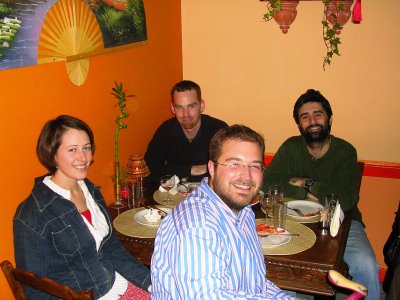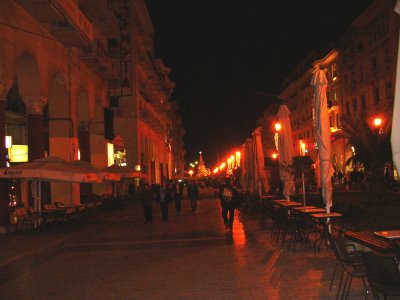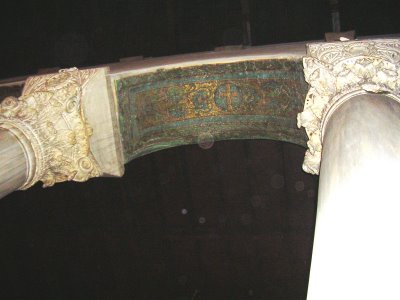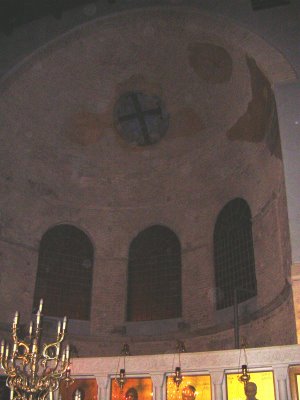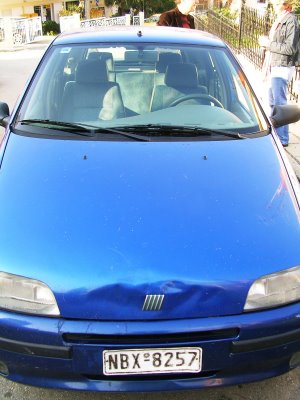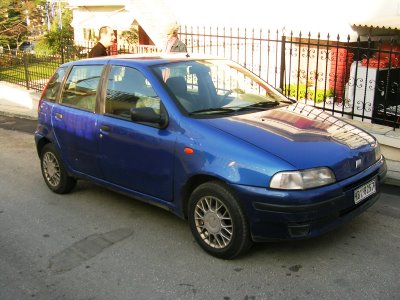I've been thinking about a coffee I had with a Greek friend after church a few weeks ago, and what it revealed to me about the Greek mindset.
First, in Panorama (as everywhere in Greece), there are about 500 cafes -- a ratio of about 1 cafe to every 8 people, I think. Of course, though, only about 3 of these cafes are actually occupied at any one time, because everyone has to go to the same cafe.
So, anyway, I asked my Greek friend to have a coffee with me after church one Sunday a few weeks ago (so that I can practice conversational Greek), and he, of course, wanted to go to the most popular (read: crowded) cafe in town. So off we went. First, we had to push and squeeze our way through the doors, and then we proceeded to circle about the place like vultures looking (through the dense haze of smoke) for a empty cubic foot of space into which we could shoehorn ourselves.
Finally, like an oasis in the desert, I saw the impossible: an enormous table with bench seats, tucked away in a quite, forgotten corner of the cafe. And what's more, it was occupied by an American couple I knew, and they said, "Here you go, we were just about to leave." What luck! I called to my friend, Paris, and showed him the table.
No. He didn't like it. He confided in me: "That's ok for Fr. Alexi -- he would like it, because he's a priest. But we, we're young -- let's go over here." To my horror, he pointed to the exact middle of this swarming beehive of activity. The tables here were -- really -- about 18 inches in diameter and you had these impossibly tiny seats around them. All I could see through the smoke was flesh pressed against flesh, and all I could hear through the din was the constant ringing of cell phones. I looked at his face to see if he was joking. He wasn't.
Not wanting to argue, I thanked the American couple and -- to their utter bewilderment -- passed on taking their table. We then plunged into the heart of the Greek cafe jungle and, through a few well-chosen elbows, managed to make our way to a table. It was here that we were finally able to shout at each other in conversation. My friend looked delighted.
Now this seems like a rather simple, boring story of getting a coffee. But the more I thought about it afterwards, the more I began to understand the Greek mindset. It's often puzzled me why -- for instance -- if you are on a deserted beach in summer that stretches for miles (or kilometers...), and a Greek couple comes along, they will inevitably sit down right beside you. Now I began to formulate a theory -- they actually like being so close to everyone. Whereas Americans feel comfortable when they have some 'personal space,' this actually makes Greeks feel isolated. They like being right in the middle of the action. If everyone is having fun, then you will also have fun by inserting yourself in the middle of the gaiety.
This also contributes to my understanding of the Greeks in other public spaces, such as the church and buses. Here also, they seem quite satisfied to be so tightly packed that you can stand without any effort on your own.
As an epilogue to my story, the following Sunday, Pelagia and I went out for coffee again with our friend Paris so that we could practice Greek. (Incidentally, he's very kind to have this sort of patience with us.) Anyway, for some reason, we didn't have a whole lot of time. So when we went to the usual cafe and it was even more crowded than before, we decided we didn't have time to wait. So we went to another cafe near our house that our friend had heard just opened after a remodeling.
Now keep in mind I had told Pelagia of my adventure the previous Sunday. So as we arrived at this other cafe (which was beautiful, and had a breathtaking overview of the city and gulf), our friend immediately noticed that they weren't many cars there (that is, they weren't parked all over the sidewalks). So he said, disappointed, "Oh, it doesn't look like very many people are here. Should we go somewhere else?"
"No!" Pelagia said quickly. "Um, I mean: No, no, that's ok. We don't want to make you drive somewhere else. Let's just stay here." I suppressed a laugh, as I knew exactly what she was thinking. He did end up liking it, because the view was so nice, and we were able to practice some Greek (and he, his English), so it all worked out.


